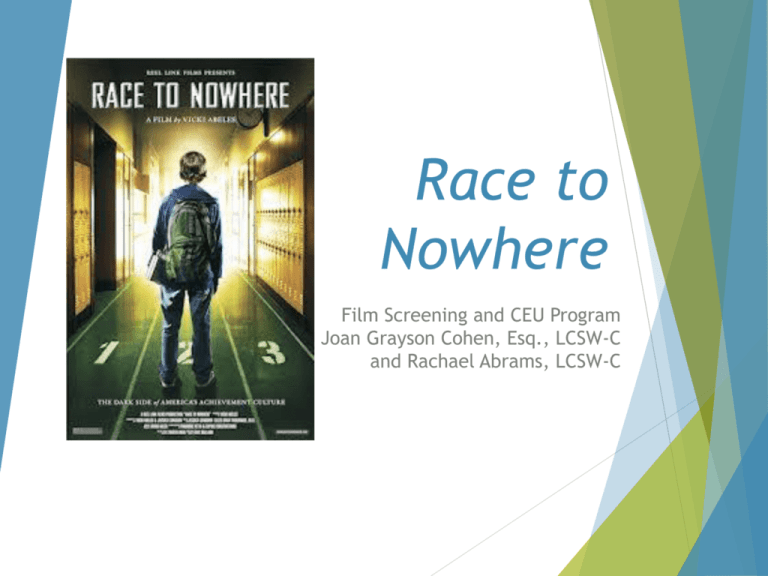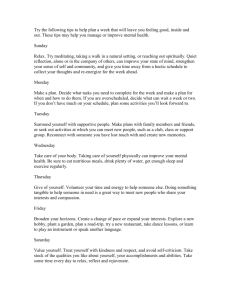Race to Nowhere 031915
advertisement

Race to Nowhere Film Screening and CEU Program Joan Grayson Cohen, Esq., LCSW-C and Rachael Abrams, LCSW-C Program Schedule 9:05am – 9:15am: Introduction 9:15am – 10:45am: Film Screening 10:45am – 11:00am: Reactions 11:00am – 11:10am: Break 11:10am – 11:55am: Clinical Presentation and Case Study 11:55am – 12:00pm: Evaluations and Wrap Up Film Overview Race to Nowhere is a documentary film examining: The effects: • Pressure faced by young people, teachers and parents in our high stakes, high stress education system • Our driven culture and the pressure placed on our students to succeed • Students pushed to the brink and immobilized to learn proper skills • Educator burnout • Overwhelmed parents without practical solutions RED FLAGS FOR OVERSCHEDULED CHILDREN Are they dragging, not wanting to go out the door? Are their grades slipping? Do they show signs of depression, stress and/or anxiety? Are they tired all the time? Do they say “they’d like more free time?” or “time for other interests?” OVER SCHEDULED CHILDREN MAY HAVE: A decrease in creativity Less of an ability to take initiative An inability to know what to do with any free time they have A lack of enthusiasm for their school work and/or activities (only going through the motions) Presentation of increased somatic issues (stomach aches, head aches etc.) CHILDREN WITH UNSTRUCTURED TIME: Have more time to process activities and learning Report more overall happiness Are less stressed and less depressed Are more creative, self driven, independent Possess more developed social skills FREE- PLAY DREAM-WORK Research has shown that there are emotional, social and cognitive benefits to free play The pace of our society has resulted in considerably less time for play in the lives of children Creative assignments for school children of all ages have decreased in order to “teach for the tests” At a very young age, creative projects and art have been dramatically reduced as part of school curriculums Free/Dream thinking has been replaced by electronics Down time for our brains to rest and dream has been eliminated TODAY’S CONTRIBUTING STRESSORS FOR OUR CHILDREN High divorce rate Need to attend to younger siblings in order to help parents Transitioning between parents’ homes Households with 2 working parents Less down time for children Distance from extended family/less support Lack of necessities due to economic pressure THE EFFECTS OF THE OVERSCHEDULED CHILD Threshold effect: benefits of activities level as a result of too many scheduled activities THE EFFECTS OF THE OVERSCHDULED CHILD Chronic stress puts children at risk for: Behavior problems Academic problems Social problems Clinical issues (depression, anxiety, eating disorders etc.) Psychosomatic problems Damaging levels of stress carried into adulthood Poor decision making THE EFFECTS OF THE OVERSCHEDULED CHILD School and Work concerns: Cheating in schools is commonplace Students are burned out Students have become disengaged Students arrive at college unprepared Young adults arrive at the work-place unprepared and uninspired Case Study and Group Discussion Questions For Discussion In your work with individuals and families what have you seen as the primary stressors for this generation? What strategies have you utilized to address these issues with children, teens and their families? What strategies have you found to be successful? What are the challenges you face in working with your clients? What Can You Do To Help? Kathy (age 16) says: "Academic stress has been a part of my life ever since I can remember. I spend about 10 hours a day on schoolwork. I'm home right now because I was feeling so sick from stress I couldn't be at school. This problem is brushed off by most people. There's this mentality of, 'You're doing well, so why are you complaining?' " Kathy reports that she started experiencing symptoms of stress in middle school, and has experienced what she thinks are panic attacks but she isn’t sure. Her heart races, she can’t catch her breath and she feels like she is frozen. I know my parents mean well but it is tough. All I hear is, 'Work harder, you're a smart kid, I know you have it in you, and if you want to go to college you need to work harder.' It's a lot of pressure. What Can You Do To Help? As her clinician, how can you help Kathy? What strategies would you recommend? What resources would you provide? What skills would you work with her to develop? What changes could Karen make to help address her concerns? Resources Overscheduled Kids, Anxious Parents by Josh Levs; http://www.cnn.ceom/2013/03/08/living/overscheduled-busy-children/ Dangers of overscheduling your child by health enews Staff; http://www.ahchealthenews.com/2013/03/25/overscheduling-yourchild-leads-to-burnout-and-less-creativity/ Busy Kids: Overscheduling Worries Overstated by Stephanie Pappas; http://www.livescience.com/13642-kids-overscheduled-extracurricularactivities.html Growing Resilient Children by Dr. Mark Frankel Children with More Free Time are More Likely to be Descried by Parents as Happy and Imaginative; http://www.harrisinteractive.com/NewsRoom/HarrisPolls/tabid/447/mi d/1508/articleId/1471/ctl/ReadCustom%20Default/Default.aspx





